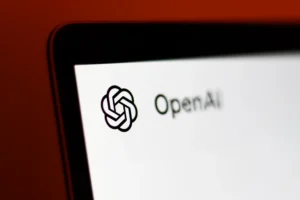The Intercept’s Lawsuit against OpenAI Advances on Claim It Removed Reporters’ Bylines
ARTIFICIAL INTELLIGENCE-AI, 25 Nov 2024
Shawn Musgrave | The Intercept - TRANSCEND Media Service

OpenAI ChatGPT website displayed on a laptop screen on 9 Sep 2024 – Associated Press
The Intercept’s lawsuit argues that the Digital Millennium Copyright Act prevents OpenAI from stripping a story’s title or byline.
22 Nov 2024 – In an order today, a federal court rejected OpenAI’s effort to toss a lawsuit filed by The Intercept over using its journalists’ work to train ChatGPT without permission or credit.
One of The Intercept’s claims under the Digital Millenium Copyright Act will move forward against OpenAI, although another claim was dismissed, along with all of its claims against Microsoft.
“This decision shows that the DMCA provides critical safeguards for news organizations against encroachment by AI companies and presents a viable approach to challenging the unauthorized use of digital news content for AI training, regardless of whether that content has been registered with the Copyright Office,” said Matt Topic, The Intercept’s attorney in the litigation and a partner at law firm Loevy + Loevy, in a statement following the order.
This is a “first-of-its kind decision,” according to Topic.
The Intercept filed its lawsuit against OpenAI and Microsoft in February, joining a growing number of media outlets that accuse the companies of various copyright violations. The Intercept offered a novel argument under a provision of the DMCA that forbids stripping out “copyright management information” such as a work’s title and author, which The Intercept alleges OpenAI did in building the training data for ChatGPT.
In a brief order, Judge Jed S. Rakoff of the U.S. District Court for the Southern District of New York allowed this claim to proceed against OpenAI. Rakoff wrote that a full opinion “explaining the reasons for this ruling will issue in due course.”
Rakoff dismissed The Intercept’s claim that OpenAI violated another provision of the DMCA, which prohibits distributing content knowing that this copyright management information was removed. He also dismissed The Intercept’s claims against Microsoft under both DMCA provisions.
________________________________________________
 Shawn Musgrave –
Shawn Musgrave –
Tags:
Artificial Intelligence AI,
ChatGPT,
Chatbot,
Claude 3,
Copyright,
Ethics,
Journalism,
Journalistic Ethics,
Justice,
Media
Share this article:
email
mastodon
facebook
🔗 copy link
DISCLAIMER: The statements, views and opinions expressed in pieces republished here are solely those of the authors and do not necessarily represent those of TMS. In accordance with title 17 U.S.C. section 107, this material is distributed without profit to those who have expressed a prior interest in receiving the included information for research and educational purposes. TMS has no affiliation whatsoever with the originator of this article nor is TMS endorsed or sponsored by the originator. “GO TO ORIGINAL” links are provided as a convenience to our readers and allow for verification of authenticity. However, as originating pages are often updated by their originating host sites, the versions posted may not match the versions our readers view when clicking the “GO TO ORIGINAL” links. This site contains copyrighted material the use of which has not always been specifically authorized by the copyright owner. We are making such material available in our efforts to advance understanding of environmental, political, human rights, economic, democracy, scientific, and social justice issues, etc. We believe this constitutes a ‘fair use’ of any such copyrighted material as provided for in section 107 of the US Copyright Law. In accordance with Title 17 U.S.C. Section 107, the material on this site is distributed without profit to those who have expressed a prior interest in receiving the included information for research and educational purposes. For more information go to: http://www.law.cornell.edu/uscode/17/107.shtml. If you wish to use copyrighted material from this site for purposes of your own that go beyond ‘fair use’, you must obtain permission from the copyright owner.
Join the discussion!
We welcome debate and dissent, but personal — ad hominem
— attacks (on authors, other users or any individual), abuse
and defamatory language will not be tolerated.
Nor will we tolerate attempts to deliberately disrupt discussions.
We aim to maintain an inviting space to focus on intelligent
interactions and debates.

